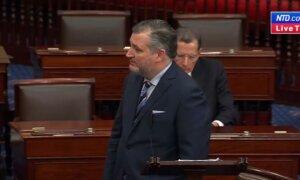‘Failure to remove him from office … is an incentive to people to do whatever they want. We just further strengthened the “royalty” of the executive branch.’
Senate Majority Leader Chuck Schumer’s (D-N.Y.) refusal to allow senators to hear the impeachment case against Secretary of Homeland Security Alejandro Mayorkas will encourage other presidential appointees to refuse to enforce laws passed by Congress, according to Rep. Mark Green (R-Tenn.).
“We write the law, they execute the law,” said Mr. Green, who, as chairman of the House Homeland Security Committee, led the Majorkas impeachment effort.
He was referring to the Constitution’s assignment of authority to Congress to write the laws and the executive branch to enforce them.
“We have now allowed an executive branch official, a presidential cabinet-level secretary, to not only not follow the law but to violate the law, and we’ve done nothing to him other than impeach him. He gets to wear that, being the sole sitting cabinet secretary to be impeached in the whole history of the country,” Mr. Green said.
“The failure to remove him from office for that is an incentive to people to do whatever they want. We just further strengthened the ‘royalty’ of the executive branch,” Mr. Green continued, suggesting that presidents and their appointees who do not enforce the law as required by the Constitution are analogous to monarchy who are a law unto themselves.
Article I accuses Mr. Mayorkas of a “willful and systemic refusal to comply with the law.” It claims that “in large part because of his unlawful conduct, millions of aliens have illegally entered the United States on an annual basis with many unlawfully remaining in the United States.
“His refusal to obey the law is not only an offense against the separation of powers in the Constitution of the United States, it also threatens our national security and has had a dire impact on communities across the country.”
Article II accuses Mr. Mayorkas of breaching the public trust by having “knowingly made false statements, and knowingly obstructed lawful oversight of the Department of Homeland Security, principally to obfuscate the results of his willful and systemic refusal to comply with the law.”
The two articles were delivered by the House impeachment managers to the Senate on April 16 and then dismissed on the following day on party-line votes.
Disincentive to Pass Laws
“Justice Kavanaugh asked the Solicitor-General, ‘Well what if the administration decides we’re not going to enforce the environmental laws, we’re not going to enforce the labor laws, and what about that?’ The Solicitor-General, Biden’s Solicitor-General, said ‘Yep, that’s consistent with your precedent, there’s nothing that can be done about that, that’s the decision of the president of the United States,” Mr. Fishman said.
The panel’s third member, Paul Taylor, former chief counsel of the House Judiciary Committee’s Subcommittee on the Constitution, said the Senate’s failure to convene the impeachment trial and hear the evidence against Mr. Mayorkas, as required by the Constitution, also discourages future Congresses from passing new laws.
“Here’s the problem: The Senate’s failure to remove Mayorkas has resulted not only in an incentive to executive branch abuse of power in the future, but a disincentive for Congress to pass legislation,” Mr. Taylor said.
The disincentive would be especially serious regarding laws that would need to be carefully negotiated through delicate compromises. If members of Congress know that executive branch officials will not enforce such laws as written, then they will be much less likely to expend the effort to reach the needed compromises, Mr. Tayler explained.
“That is going to have huge ripple effects downwind in terms of the reluctance of members in this space to support legislation while knowing that any provisions in it could be ignored by the executive branch with impunity,” Mr. Tayler said.
A spokesman for Mr. Schumer did not respond to The Epoch Times’ request for comment.
A spokeman for Ms. Prelogar did not respond to The Epoch Times request for comment.
Original News Source Link – Epoch Times
Running For Office? Conservative Campaign Consulting – Election Day Strategies!


